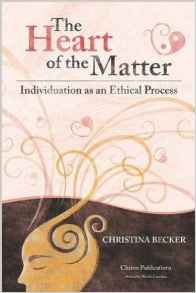
Individuation as an Ethical Process
By
Christina Becker
When Freud invented the “love cure,” he soon realized
that he had opened a can of worms. That is, what boundaries does love recognize?
How far should the doctor go for his patient? When two people sit alone and
share confidentialities, a special relationship develops. Are there no bounds?
Are there any limits to what a therapist might do in order to serve the
interests of the patient?
These questions seem extremely relevant and recognizable
when I rephrase the issue as the phenomenon of sexual exploitation of patients
and clients by their healers, mentors and priests,. You’ve probably read some
about this corruption. I don’t know if you realized that Jung also confronted
this issue, and had some relationships with clients that would be illegal today.
I wouldn’t be mentioning this book if it were relevant
only to therapists and sexual exploitation. I am bringing this very readable yet
profound book to your attention because 1) It has “heart” in the title and
offers many insights about heart as a channel of awareness, 2) it discusses the
paradoxes and mysteries of “the talking cure” and 3) because it takes us on an
important journey of working through our conscience, where we hope to follow our
heart and yet be consistent with society’s applicable norms.
I’m pleased to receive confirmation of what I suspected
was an established fact: The heart is able to integrate the individual with the
universal, the human with the spiritual. I have worked with it because the
psychic and the spiritual combine in that energy field. Becker brings a lot more
support to honoring this special channel of awareness.
The book is full of Jungian terminology, as it arose from
the author’s doctoral dissertation as part of becoming an official Jungian
analyst, but it is still worth reading. In my collection of books on boundaries,
this one contains the best discussions of the process of working through the
heart with conscience. It brings up little things that most folks would not
notice. Boundaries in therapy are not just about sex. How much help do you give?
When do you “bend the rules?”
There is quite a bit of personal assistance going around
these days, from coaches, mentors, workshop leaders, not to mention teachers and
therapists. I’ve found that most “lightworkers” have a light touch on
boundaries. Some of that comes from our emerging paradigm of oneness, but some
comes from a lack of careful consideration of how some of our statements and
actions affect our client’s autonomy and freedom of choice. Becker’s book makes
clear that it is not easy to work through these dilemmas, and she has presented
some of the best meditations I’ve ever read on the process.
Becker has a lot of interesting things to say about
the heart, especially as it can mediate between the human and the divine. The
human, a member of society, knows of rules to follow. But when two people come
together to explore the unconscious, they can become so joined that the “Voice
of God” might dictate all sorts of comingling among souls. It is the heart, she
advocates, with a lot of patience and the ability to withstand the tension of
the opposites, that can come up with the right action that respects the
individual and yet is informed by the gods. I like it that she uses my favorite
image for dealing with this predicament. She refers to the story in Homer’s
Odyssey, where our hero approaches
the island of the Sirens. Here are the mermaids whose songs attract sailors like
flies to honey, only to have them crash their boats on the seashore rocks.
The solution: Our hero plugs the
ears of the sailors (symbol of the lower self), so they won’t be affected as
they come so close to the women singing. He then has himself tied to the boat’s
mast (symbol of the spiritual ideal he holds) so he cannot act out while he
becomes enraptured. That approach takes a lot of wisdom, heart, and earnestness.
There’s another aspect to this book that attracts my
favorable regard. It has to do with reconciliation. As Gibran remarked in
The Prophet, and I paraphrase, the
victim is not completely innocent of the crime perpetrated. We make the
distinction and create a boundary between perp and victim, which leads to
recrimination, anger, frustration, guilt, etc., but no healing. Wanting to get
beyond such dichotomies, Becker hit upon her discovery of indigenous healing
circles, where dialogue, not blame, is the order of the day. I’m reminded of the
book,
Talking
Stick, by Stephan Beyer, who presents a similar “council” approach (also
based upon indigenous tradition) to healing the perp-victim wound. Becker
describes the indigenous use of the “circle” to bring back together what had
been broken, split and polarized.”
I’m very glad to see this book come out, speaking with
depth and compassion about a very real challenge, and that she found that
“heart” was the solution, and that our indigenous ancestors had already figured
out how to apply this wisdom in a practical way that makes a difference!
From the Publisher
The Heart is the meeting place of the individual and
the divine―the inner ground of morality, authenticity, and integrity. The
process of coming to the Heart and realizing the person we were meant to be is
what Carl Jung called “Individuation.” This path is full of moral challenges for
anyone with the courage to take it up.
Using Jung’s premise―that the main causes of
psychological problems are conflicts of conscience―the author takes the reader
through the philosophical and spiritual aspects of the ethical dimensions of
this individual journey toward wholeness.
This book is a unique contribution to the link between
individuation and ethics.